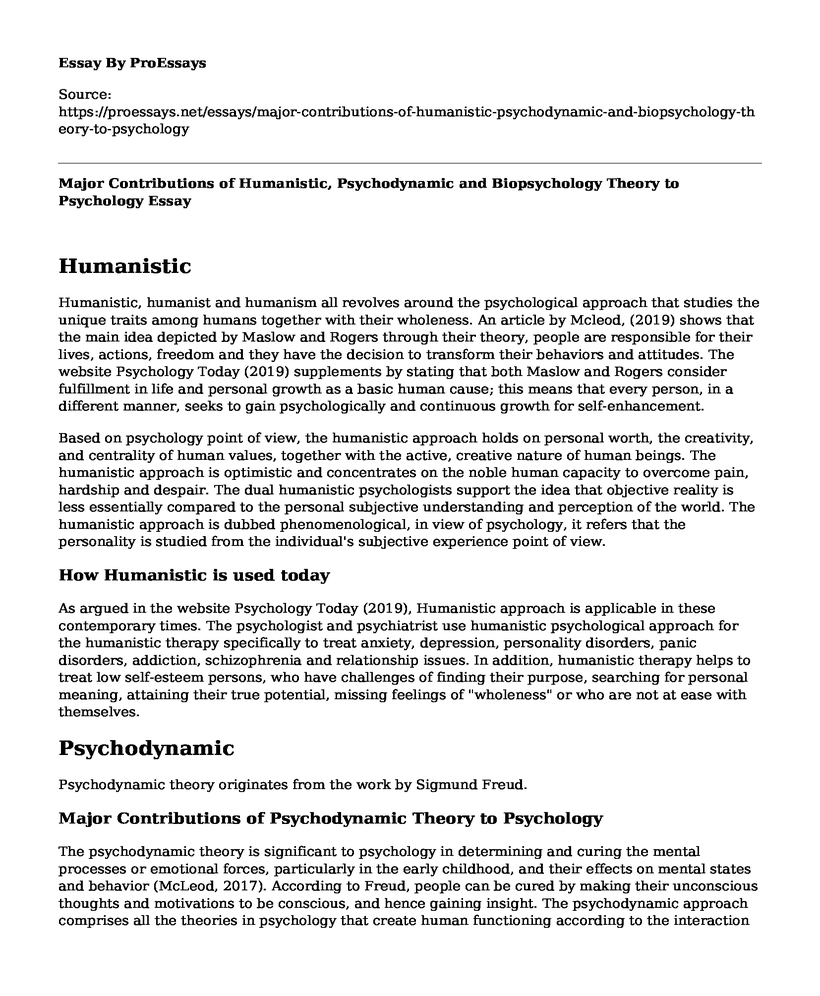Humanistic
Humanistic, humanist and humanism all revolves around the psychological approach that studies the unique traits among humans together with their wholeness. An article by Mcleod, (2019) shows that the main idea depicted by Maslow and Rogers through their theory, people are responsible for their lives, actions, freedom and they have the decision to transform their behaviors and attitudes. The website Psychology Today (2019) supplements by stating that both Maslow and Rogers consider fulfillment in life and personal growth as a basic human cause; this means that every person, in a different manner, seeks to gain psychologically and continuous growth for self-enhancement.
Based on psychology point of view, the humanistic approach holds on personal worth, the creativity, and centrality of human values, together with the active, creative nature of human beings. The humanistic approach is optimistic and concentrates on the noble human capacity to overcome pain, hardship and despair. The dual humanistic psychologists support the idea that objective reality is less essentially compared to the personal subjective understanding and perception of the world. The humanistic approach is dubbed phenomenological, in view of psychology, it refers that the personality is studied from the individual's subjective experience point of view.
How Humanistic is used today
As argued in the website Psychology Today (2019), Humanistic approach is applicable in these contemporary times. The psychologist and psychiatrist use humanistic psychological approach for the humanistic therapy specifically to treat anxiety, depression, personality disorders, panic disorders, addiction, schizophrenia and relationship issues. In addition, humanistic therapy helps to treat low self-esteem persons, who have challenges of finding their purpose, searching for personal meaning, attaining their true potential, missing feelings of "wholeness" or who are not at ease with themselves.
Psychodynamic
Psychodynamic theory originates from the work by Sigmund Freud.
Major Contributions of Psychodynamic Theory to Psychology
The psychodynamic theory is significant to psychology in determining and curing the mental processes or emotional forces, particularly in the early childhood, and their effects on mental states and behavior (McLeod, 2017). According to Freud, people can be cured by making their unconscious thoughts and motivations to be conscious, and hence gaining insight. The psychodynamic approach comprises all the theories in psychology that create human functioning according to the interaction of forces and drives within the particularly unconscious, person, and between the various forms of personality. Since Freud's time, psychodynamic perspective has evolved, and currently incorporates innovative new approaches like the neuropsycho-analysis and object relations theory (Bornstein, 2019).
How Psychodynamic is used today
Today, psychodynamic is useful to release repressed experiences and emotions; this includes making the unconscious conscious. In addition, the recent research by Bornstein (2019) shows that psychodynamic therapy can treat depression alongside other chronic psychological disorders, particularly in those that have lost meaning in their lives and have problems creating or sustaining personal relationships. Studies have categorized psychoanalysis therapy as one of the essential tools in the field of psychology as it is effective among people with social anxiety, addiction and eating disorders.
Biopsychology
There is no founder of biopsychology.
Major Contributions Biopsychology in Theory to Psychology
Biopsychology plays a significant role in the field of psychology as it determines how the neurotransmitters together and the brain, and other relevant aspects of human biology, influence the feelings, behaviors and thoughts of a person. Also, Kendra (2018, May 04) adds that the biopsychology contributes to the theory of psychology as it determines and cures the functioning of the normal, poorly developed and injured brains. Fundamentally, the theory is divided into cognitive neuroscience, neuropsychology, and behavioral neuroscience. In psychology, biopsychology is the only approach that examines feelings, thoughts, and behaviors from a biological and physical point perspective.
The use of Biopsychology Today
Biopsychology currently applies in the psychological field by looking at how the biological process interacts with cognition, emotions together with other mental processes. According to Pinel and Barnes (2018), the uses of Biopsychology during contemporary times are viewed in three main perspectives:
Physiology: to determine how the hormones and the nervous system operates, the brain functionality, changes in functions and/or structure influences behaviors. In the practical example, Bio-psychologist can ask how the prescribed drugs to treat depression influences behavior through their contact with the nervous system (Pinel & Barnes, 2018).
Comparative method: it explains how various human psychology is compared and studied. This applies in the search and understanding of human behavior (Pinel & Barnes, 2018).
Investigation of inheritance: describes what and human inherits some character traits from its parents, mechanism of inheritance (genetics). One example is to determine why one's psychological characteristics were inherited from the parents (Pinel & Barnes, 2018).
References
Bornstein, R. (2019). The Psychodynamic Perspective. Retrieved from https://nobaproject.com/modules/the-psychodynamic-perspective
Kendra Cherry. (2018, May 04). What Is Biopsychology? (Brain and Behavior). Retrieved February 05, 2019, from very well mind: https://www.verywellmind.com/what-is-biopsychology-2794883
McLeod, S. (2017). Psychodynamic Approach | Simply Psychology. Retrieved from https://www.simplypsychology.org/psychodynamic.html
Mcleod, S. (2019). Humanism | Simply Psychology. Retrieved from https://www.simplypsychology.org/humanistic.htmlPinel, J. P. J., & Barnes, S. (2018). Biopsychology. Singapore: Pearson Education.
Psychology Today. (2019). Humanistic Therapy. Retrieved from https://www.psychologytoday.com/us/therapy-types/humanistic-therapy
Cite this page
Major Contributions of Humanistic, Psychodynamic and Biopsychology Theory to Psychology. (2022, Nov 20). Retrieved from https://proessays.net/essays/major-contributions-of-humanistic-psychodynamic-and-biopsychology-theory-to-psychology
If you are the original author of this essay and no longer wish to have it published on the ProEssays website, please click below to request its removal:
- The Development of Personality Extremity
- Essay Sample on the Play Therapy
- Case Study: Postpartum Psychosis
- Essay Sample on Leading Personality Theorist: Alfred Adler
- Why Should We Care About Depression Disorder? Annotated Bibliography
- Personality Test Unveils My Mind, Relationships & Career Path - Essay Sample
- Essay Sample on Explaining Growth and Development: Bandura's Social Cognitive Theory







